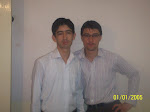HOW CAN ONE THANK GOD FOR HIS BEING THE LORD?
He asked: ‘Am I not (your Lord)?’ and you responded: ‘Yes!’How can one thank Him for that ‘yes’? By suffering misfortunes! What is the mystery of that 'yes'? It is that you say:‘I am a slave in chains in the abode of poverty and perishing.’
What has he found who has lost God? And what has he lost who has found God?
Good tidings await those who are seen (by others) as strange and outlandish (because of their Islamic beliefs)!
Do you know what ‘sama’ (whirling in ecstasy) is?It is to enjoy permanence in absolute annihilation of the self.
IS “THE BEST OF THE YOUNG AMONG YOU ARE THOSE LIKE THE OLD AMONG YOU, AND THE WORST OF THE OLD AMONG YOU ARE THOSE LIKE THE YOUNG AMONG YOU,” A PROPHETIC SAYING? IF SO, WHAT IS MEANT BY IT?
I have also heard it referred to as a prophetic saying. What is meant by it is this: The best of the young is he who, like an old man, thinks of death and, without being captivated by fancies of youth, strives for his next life. As for the worst of the old, he is that old man who, trying to imitate the young in worldly aspirations in heedlessness of Divine commandments, obeys, like a youth, the temptations of his carnal self.
The correct form of the second part of your framed inscription is as follows – I hung it on the wall as a warning-notice and I look at it every morning and evening to take a lesson:
If you want a friend, God is sufficient. Indeed, if He is a friend to you, so is everything.
If you want companions, the Qur’an is sufficient. You may imagine yourself to be in the company of the Prophets and angels mentioned in the Qur’an, study their experiences and are intimate with them.
If you want wealth, contentment is sufficient. Indeed, the one with contentment becomes thrifty, and the one who is thrifty gets blessed abundance in his wealth.
If you want to feel enmity, your evil-commanding self is sufficient as an enemy. One who is self-conceited obtains grieves but one who is not haughty obtains care and peace.
If you want counsel, death is sufficient. The one who thinks of death, gets rid of love of the world and strives for his next life.
I am adding to your seven, an eighth, which is as follows:
A few days ago, a memorizer of the Qur’an recited a certain portion of the Sura Yusuf, down to the verse, Make me die a Muslim (submissive unto You), and join me with the righteous. (12:101)
Suddenly a subtle point occurred to me: Everything related to the Qur’an and faith is, no matter how insignificant it may seem, in fact, of great significance. Anything that contributes to eternal happiness is not insignificant, so, we should not regard it as unworthy of explanation.
This is the finest, most subtle point of the finest Qur’anic story: The verse, Make me die a Muslim (submissive unto You), and join me with the righteous, which marks the end of the story of Yusuf, upon him be peace, – the finest story in the Qur’an – is expressive of a glad tiding in a vivid and miraculous fashion. It is as follows:
The pleasure received from a joyful happy story results in a deep sorrow because of the final news of separation or death. This is really so, or arouses more sorrow, when we get the news of separation or death at a time when the character of the story has just found ease and happiness. However, the verse quoted above, even if it contemplates the death of the Prophet Yusuf (Joseph) at the happiest point of his life when he became the Aziz (grand-vizier or chancellor) of Egypt and re-united with his parents and brothers, it gives it in a different way and declares: In order to be the object of a far greater happiness, the Prophet Yusuf prayed God for his death and, through death, he received that happiness. This means that a more attractive and pleasure-giving bliss than the greatest happiness of the world is awaiting us at the other side of the grave. It is because of this that a truth-seeing person like the Prophet Yusuf, in order to find that bliss, asked for death, which is apparently very painful, when he was enjoying the greatest happiness of the world.
Look, then, at the eloquent way the Wise Qur’an reports to us the end of the story of the Prophet Yusuf, and see how it adds, instead of giving pain and regret, to the joy and happiness of the listener. Further, it guides us to the fact that we should strive for the other side of the grave, where are found real happiness and pleasure. It also demonstrates the exalted truthfulness of the Prophet Yusuf and announces that even the most joyful and brightest condition of the worldly life cannot captivate him, rather it leads him to ask for death and the other life
Thursday, April 16, 2009
Subscribe to:
Post Comments (Atom)
Love is reckless
Love is reckless; not reason.
Reason seeks a profit.
Love comes on strong,
consuming herself, unabashed.
Yet, in the midst of suffering,
Love proceeds like a millstone,
hard surfaced and straightforward.
Having died of self-interest,
she risks everything and asks for nothing.
Love gambles away every gift God bestows.
Without cause God gave us Being;
without cause, give it back again.
Reason seeks a profit.
Love comes on strong,
consuming herself, unabashed.
Yet, in the midst of suffering,
Love proceeds like a millstone,
hard surfaced and straightforward.
Having died of self-interest,
she risks everything and asks for nothing.
Love gambles away every gift God bestows.
Without cause God gave us Being;
without cause, give it back again.

No comments:
Post a Comment